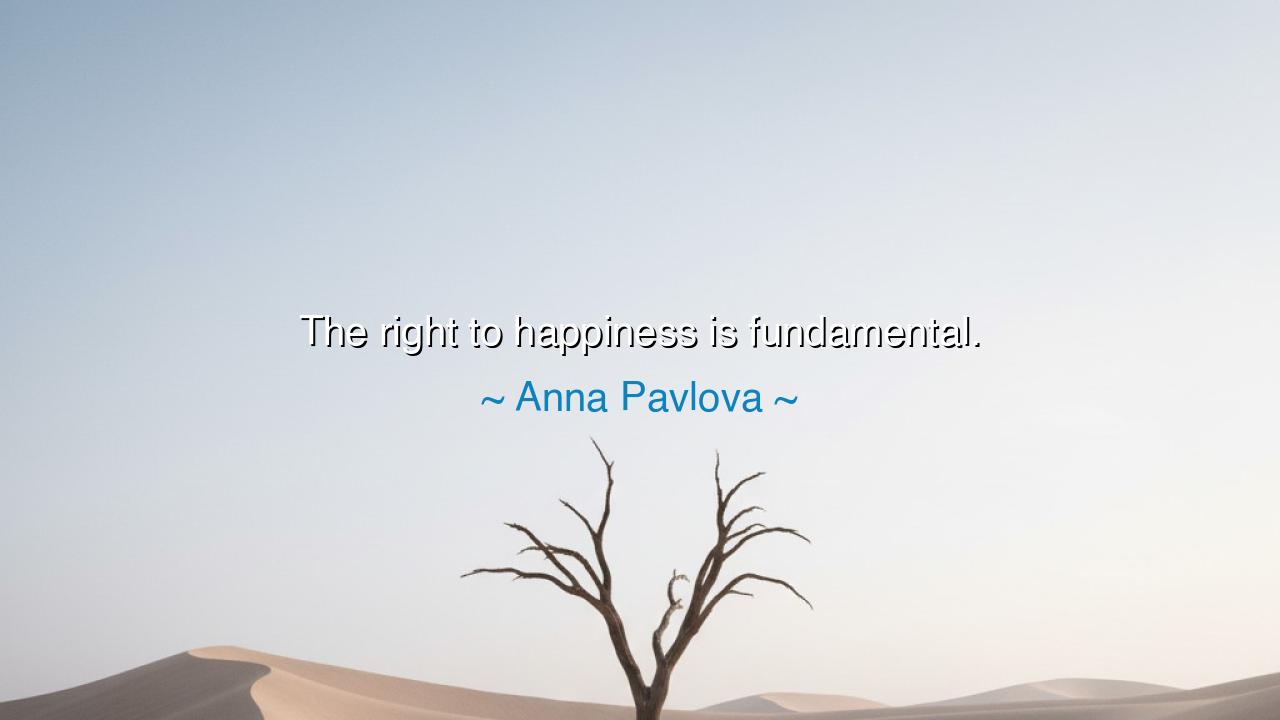
The right to happiness is fundamental.






The words of Anna Pavlova — “The right to happiness is fundamental.” — rise like a soft yet unyielding song from the soul of one who danced through both beauty and hardship. In these few words, the legendary ballerina declares a truth that transcends nations, ages, and creeds: that happiness is not a privilege granted by others, but a sacred birthright bestowed upon every human being by life itself. Pavlova, who devoted her existence to the art of dance, understood that joy is not a reward to be earned, but an essence to be protected — a flame within the human heart that must never be extinguished by fear, oppression, or despair.
Born in 1881 in the shadows of poverty and hardship, Anna Pavlova rose to become one of the greatest dancers in history — not through ease, but through struggle. She endured rejection, ridicule, and the relentless demands of her craft, yet through it all, she never lost her inner light. To her, dance was not mere movement but the expression of happiness, a form of freedom beyond words. When she said that “the right to happiness is fundamental,” she spoke not only as an artist but as a human being who had fought to preserve her joy against the darkness of circumstance. She knew that to deny anyone their happiness — to deny them the freedom to love, to create, to believe — is to deny them their very humanity.
To call happiness a right is a bold and timeless declaration. It is to affirm that joy, dignity, and peace belong to all people, not just the fortunate few. The rulers of old claimed power as divine, and the strong took from the weak as though destiny had decreed it so. But Pavlova’s words stand as a quiet rebellion against such arrogance. Like the thinkers of the Enlightenment — who wrote of liberty, equality, and the pursuit of happiness — she understood that joy is the breath of the soul, and that life without it is but a hollow existence. Yet where philosophers argued, Pavlova danced. Through her movement, she gave life to the truth that happiness cannot be legislated or confined; it is the natural rhythm of the human spirit when it moves freely and authentically.
History, too, bears witness to those who have defended this right not with words or art, but with their very lives. Consider the life of Nelson Mandela, who spent twenty-seven years imprisoned yet emerged with grace and forgiveness in his heart. When asked how he survived such suffering without hatred, he replied that bitterness would have been another kind of prison. His liberation was not only political, but spiritual — for he claimed his right to happiness, to inner peace, even when stripped of freedom. In his courage, we see Pavlova’s truth embodied: that the right to happiness cannot be taken by chains or cruelty, for it is not granted by the world; it is born within the soul.
But Pavlova’s teaching carries another, deeper wisdom — that the right to happiness also carries responsibility. To recognize this right in ourselves is to honor it in others. The one who seeks happiness at the expense of another’s peace corrupts the very meaning of joy. True happiness is not selfish indulgence, but harmony — the joy of being in tune with one’s own spirit and with the world. Pavlova’s art, filled with grace and compassion, reminds us that happiness shared becomes magnified, that joy given freely becomes eternal. Her life’s work was not just to perform but to uplift, to awaken the sleeping hearts of others through the beauty of movement and emotion.
And so, when Pavlova declared that “the right to happiness is fundamental,” she spoke to all who have ever doubted their worth or feared to follow their dreams. She calls to the weary and the oppressed, to the dreamers and the doubters, and reminds them that joy is not a luxury — it is the very essence of life. Happiness is the divine permission to live fully, to create without fear, to love without shame. To protect this right — in ourselves and in others — is to protect the flame of humanity itself.
Let this truth be your guiding light: defend your right to happiness as fiercely as you would your freedom. Do not wait for life to hand you joy; seek it, cultivate it, create it through gratitude and courage. Choose the path that brings you closer to your truest self. Celebrate your passions without apology, and let kindness be the measure of your happiness. For every act of love, every pursuit of beauty, every moment of peace is a silent declaration of your divine right to be whole.
And remember the wisdom of Anna Pavlova — that happiness is not found in perfection, nor granted by power, but born in the heart that dares to dance, even when the world stands still. Claim that right. Protect it. Live it. For to live joyfully, even in the face of sorrow, is the greatest act of courage, and the purest expression of what it means to be human.






AAdministratorAdministrator
Welcome, honored guests. Please leave a comment, we will respond soon